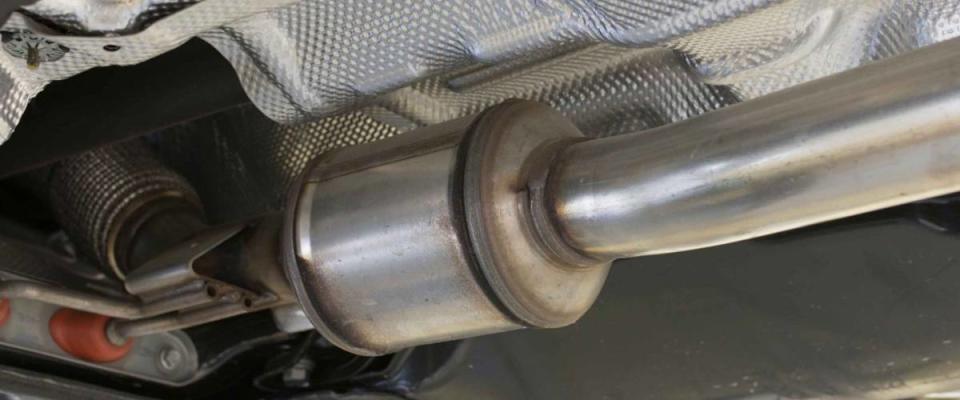Thefts of catalytic converters are way up — here's how to protect yourself

One business that’s been booming amid the pandemic is auto theft, which skyrocketed last year.
And increasingly, thieves aren’t even targeting the whole car. Instead, they’re going after the valuable container of precious metals attached to every car’s undercarriage: the catalytic converter.
All across America, local police departments are reporting surges in cases of stolen catalytic converters, and motorists — many of whom are getting stuck with huge repair bills — are looking for ways to protect themselves.
Read on to find out why this crime wave is suddenly cresting — and for tips on how to make sure your auto insurance will protect you if your vehicle is targeted.
How bad is the problem?

At the moment, there’s scarce national data on the problem, but there are disturbing statistics coming out of many U.S. cities.
In Denver, to take one particularly stark example, there were 15 catalytic converters reported stolen in 2019. In 2020 it was 257. But in January of 2021 alone 108 thefts were reported, according the local ABC News affiliate.
In one incident in the city in February, 14 catalytic converters were stolen in about an hour when thieves hit a vehicle fleet, causing more than $20,000 in damage.
Other cities, such as S. Louis and Wichtia, Kansas, are reporting similarly steep spikes, according to a recent New York Times report.
Why are catalytic converters in demand?

A catalytic converter has been installed between the engine and muffler of just about every car and truck sold in the U.S. since the mid-1970s.
Inside, they’re coated with precious metals like platinum, rhodium and palladium, which clean toxic pollutants from the vehicle’s exhaust.
As emissions rules become increasingly strict around the globe, especially in China, demand for the materials used in catalytic converters has also skyrocketed.
As a result, the materials found in catalytic converters are, quite literally, more valuable than gold. The price of rhodium, one of the precious metals found in catalytic converters, has soared from less than $650 an ounce around 2015 to almost $22,000 an ounce in 2021. That’s more than 10 times the price of gold.
On an average car, a converter can cost up to $2,000 to replace or more, depending on the make and model.
And, unfortunately for car owners, catalytic converters aren’t difficult to steal. A single person armed with only a hacksaw and a jack can easily slide under a vehicle and cut off the target device in mere minutes. With larger vehicles like trucks and SUVs, which sit higher off the ground, the jack isn’t even necessary.
Booming black market

It’s easy to find ads promising quick cash for catalytic converters on sites like Facebook Marketplace and Craigslist.
The most valuable devices are those taken from certain older foreign cars, which contain more of the precious metals than newer vehicles.
Another model that’s popular with thieves is the Toyota Prius. Because the hybrid doesn’t use its gasoline engine as often as a standard car, the metals in Prius converters don’t burn out as fast.
What can I do?

Anyone who owns a car is a potential target for catalytic converter theft, and should be be taking the following measures:
Park in well-lit areas. If you have your own garage, park inside rather than on the street. In a public lot, park near a building entrance or the access road, as pedestrian traffic could discourage thieves.
Use anti-theft devices. You can get devices to attach to your converter to make it harder to steal, or calibrate your car alarm to be set off by vibration, so the act of a thief trying to saw off your converter will trigger the alarm. You can also have the converter welded in place to make it more difficult to remove.
Put your VIN on your converter. Etching your vehicle identification number or license plate number onto your converter can make it easier to track down in the event that it is stolen.
Strengthen your protection with auto insurance

Even if you take steps, you can still find yourself a victim of catalytic converter theft.
In the case of one man interviewed by the New York Times, the converter was stolen from his used Toyota Prius, but he didn’t have full insurance coverage and was forced to pay more than $3,000 to get it replaced — almost half of what he’d paid for the car itself.
Don’t put yourself in that position. Make sure that your auto policy includes comprehensive coverage, which covers theft.
Next, make sure you aren’t paying too much. If you haven’t comparison-shopped over the last six months, you could be wasting more than $1,000 per year. With a free quote-comparing service, you could find the best price in minutes.
And if you’ve found yourself driving less during the pandemic, you could convince your provider to give you a break. Ask for a COVID “stimulus check” from your insurance company in the form of a rebate or credit on your premiums. And if they don't give you one, find another provider that will.
Above all, don’t let yourself become be yet nother statistic contributing to this alarming trend.

 Yahoo Finance
Yahoo Finance 